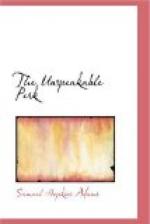“Why shouldn’t I be clean?”
“Of course you should. But people get slack, don’t they, when they live off all alone by themselves? Still, I suppose you spruced up a little for me?”
“Nothing of the sort,” he denied, with heat.
“No? Oh, my poor little vanity! He wouldn’t dress up for us, Vanity, though we did dress up for him, and we’re looking awfully nice—for a voice, that is. Do you always keep so soft and pink and smooth, Mr. Beetle Man?”
“I own a razor, if that’s what you mean. You’re making fun of me. Well, I don’t mind.” He lifted his voice and chanted:—
“Although beyond the
pale of law,
He always kept a polished
jaw;
For he was one of those who
saw
A
saving hope
In
shaving soap.”
“Oh, lovely! What a noble finish. What is it?”
“Extract from ‘Biographical Blurbings.’”
“Autobiographical?”
“Yes. By Me.”
“And are you beyond the pale of law?”
“Poetical license,” he explained airily. “Hold on, though.” He fell silent a moment, and out of that silence came a short laugh. “I suppose I am beyond the pale of law, now that I come to think of it. But you needn’t be alarmed, I’m not a really dangerous criminal.”
Later she was to recall that confession with sore misgivings. Now she only inquired lightly:
“Is that why you ran away from the tram car yesterday?” “Ran away? I didn’t run away,” he said, with dignity. “It just happened that there came into my mind an important engagement that I’d forgotten. My memory isn’t what it should be. So I just turned over the matter in hand to an acquaintance of mine.”
“The matter in hand being me.”
“Why, yes; and the acquaintance being Mr. Cluff. I saw him throw four men out of a hotel once for insulting a girl, so I knew that he was much better at that sort of thing than I. May I go back now and sit down?” “Of course. I don’t know whether I ought to thank you about yesterday or be very angry. It was such an extraordinary performance on your part—”
“Nothing extraordinary about it.” His voice came up out of the shadow, full of judicial confidence. “Merely sound common sense.”
“To leave a woman who has been insulted—”
“In more competent hands than one’s own.”
“Oh, I give it up!” she cried. “I don’t understand you at all. Fitzhugh is right; you haven’t a tradition to your name.”
“Tradition,” he repeated thoughtfully. “Why, I don’t know. They’re pretty rigid things, traditions. Rusty in the joints and all that sort of thing. Life isn’t a process of machinery, exactly. One has to meet it with something more supple and adjustable than traditions.”
“Is that your philosophy? Suppose a man struck you. Wouldn’t you hit him back?”
“Perhaps. It would depend.”
“Or insulted your country? Don’t you believe that men should be ready to die, if necessary, in such a cause?”




